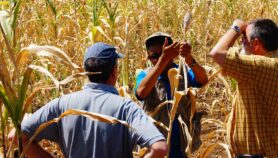By: Archita Bhatta
Send to a friend
The details you provide on this page will not be used to send unsolicited email, and will not be sold to a 3rd party. See privacy policy.
[NEW DELHI] Strains of the rotavirus, earlier present only in animals, are increasingly being found in human beings, says a new study.
The study, published in Infection, Genetics and Evolution on 2 December, is part of a series on new rotavirus strains. It points to uncommon genotypes traced to cows and pigs that were isolated from a 13-month-old boy and a 10-month-old girl admitted to a hospital in Kolkata with rotavirus diarrhoea.
An earlier study had shown strains similar to virus genotypes present in animals in the stools of a 14- month-old child, also in Kolkata. The studies suggest that strains of the virus normally found in animals are gradually establishing themselves in human beings.
"Transmission from animals to humans occurs at low frequency due to inability of the virus to spread from human to human, or for reasons that we do not know," Mamata Chawla-Sarkar, lead author of both studies, told SciDev.Net.
SPEED READ
- Animal origin rotavirus strains found infecting humans
- Existing vaccines are ineffective against the new strains
- Disease severity is greater with animal origin strains of rotavirus
"However, if a person gets infected with a virus of animal origin or strains with new surface antigens, the disease severity will be more since people have low or no immunity against them," Chawla-Sarkar, scientist at the virology division of the National Institute of Cholera and Enteric Diseases, Kolkata, says.
Jacob M. Puliyel, consultant physician at the St. Stephen’s Hospital, New Delhi, says the study establishes that mixing viral strains from humans, cows and pigs can result in new strains. In India, he notes, the interaction between humans and the animals is high.
Regular surveillance of the rotavirus carried out under the Indian Council of Medical Research has indicated the need to develop a vaccine capable of providing protection against all strains.
The detection of animal origin strains comes as debate is raging over the relevance of plans to include vaccination against rotavirus in India’s national immunisation programme.
An article co-authored by Puliyel and published in the British Medical Journal in November protests that the "World Health Organisation recommended universal rotavirus vaccination well before regional evidence of its effectiveness was collected."
"No studies have looked at the efficacy of the vaccine in India, but studies from Bangladesh and Vietnam show vaccine efficacy against rotavirus diarrhoea is 48 per cent. This is much lower than in the West, where efficacy is around 90 per cent," the article said.
According to Puliyel, due to the emergence of new strains existing rotavirus vaccines have not worked in India and new vaccines are likely to be ineffective.
Chawla-Sarkar is, however, convinced that vaccines would help check rotavirus infections. "Studies in India encompassing different geographical areas have shown that in children below five years of age 40 per cent of hospitalised cases of gastroenteritis are due to rotavirus."
"Immunisation is highly recommended to reduce mortality and disease severity in the absence of antiviral drugs and because safe drinking water and hygiene are issues," she says.













